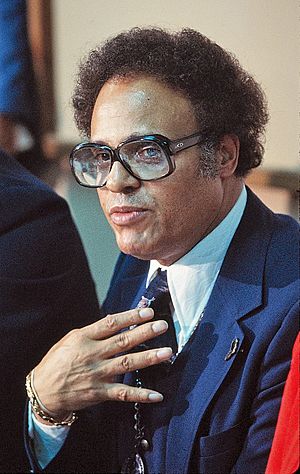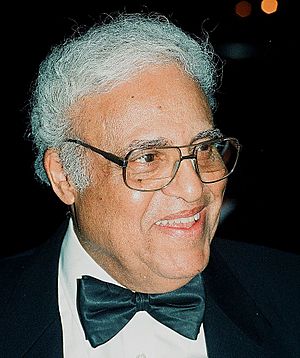Benjamin Hooks facts for kids
Quick facts for kids
Benjamin Hooks
|
|
|---|---|

Hooks in the 1970s
|
|
| Executive Director of the National Association for the Advancement of Colored People | |
| In office 1977–1992 |
|
| Preceded by | Roy Wilkins |
| Succeeded by | Benjamin Chavis |
| Commissioner of the Federal Communications Commission | |
| In office July 5, 1972 – July 25, 1977 |
|
| President | Richard Nixon Gerald Ford Jimmy Carter |
| Personal details | |
| Born | January 31, 1925 Memphis, Tennessee, U.S. |
| Died | April 15, 2010 (aged 85) Memphis, Tennessee, U.S. |
| Resting place | Elmwood Cemetery Memphis, Tennessee |
| Spouse | Frances Dancy |
| Children | 1 |
| Alma mater | LeMoyne-Owen College Howard University (BA) DePaul University (JD) |
| Military service | |
| Allegiance | |
| Branch/service | |
| Years of service | 1944–1945 |
| Rank | Staff Sergeant |
| Battles/wars | World War II |
Benjamin Lawson Hooks (born January 31, 1925 – died April 15, 2010) was an important American leader. He fought for civil rights, which means equal rights for all people. He was also a Baptist minister and a lawyer. From 1977 to 1992, he led the National Association for the Advancement of Colored People (NAACP). This group works to make sure everyone has fair treatment.
Benjamin Hooks also worked for the government. From 1972 to 1977, he was the first African American member of the Federal Communications Commission (FCC). The FCC makes rules for TV, radio, and other communication.
Contents
Early Life and Family
Benjamin Hooks was born in Memphis, Tennessee. He was the fifth of seven children. His father owned a photography studio. His family was comfortable for black families at that time. Still, Benjamin remembered wearing hand-me-down clothes. His mother worked hard to feed and care for the family.
His grandmother, Julia Britton Hooks, was very inspiring. She graduated from college in 1874. She was only the second black woman to do so. She was also a talented musician. She taught music at Berea College. Her sister became a doctor. This family history encouraged Benjamin to work hard. He wanted to go to college too.
Education and Early Challenges
Benjamin Hooks went to LeMoyne–Owen College in Memphis. He studied to become a lawyer from 1941 to 1943. During these years, he saw how unfair segregation was. Segregation meant black people had separate, often worse, facilities. He remembered not being able to use restrooms or eat in certain restaurants.
After college, he joined the Army in 1944. He guarded Italian prisoners of war. He found it upsetting that these prisoners could eat in places where he was not allowed. He left the Army as a staff sergeant after World War II.
After the war, he wanted to study law. No law school in Tennessee would accept him because he was black. So, he went to DePaul University College of Law in Chicago. He earned his law degree in 1948.
Starting a Legal Career
After law school, Hooks went back to Memphis. He was determined to fight segregation. He passed the Tennessee bar exam. Then, he opened his own law practice. It was hard because of prejudice. Law clerks would insult him. White bar associations would not let him join. Judges often called him "boy" instead of his name.
Despite this, he felt judges were fair in court. He noted that things improved over time. By 1949, he was one of only a few black lawyers in Memphis. He became friends with Dr. T. R. M. Howard, a civil rights leader. Hooks attended important meetings. He helped plan ways to fight segregation in court. This was before the famous Brown v. Board of Education decision.
Public Service and Ministry
In 1956, Benjamin Hooks became a Baptist minister. He preached regularly at Greater Middle Baptist Church in Memphis. He also continued his law practice. He joined Martin Luther King Jr. and other leaders. They formed the Southern Christian Leadership Conference (SCLC). He took part in sit-ins and boycotts. These were peaceful protests against unfair rules.
Hooks also tried to enter politics. He ran for state legislature and judge. He didn't win at first. But he gained support from black voters and some white voters. In 1965, he became the first black criminal court judge in Tennessee. He won election for a full term in 1966.
By the late 1960s, Hooks was a judge, lawyer, and minister. He also hosted local TV shows. His wife, Frances, was a great support. She became his assistant and travel companion. She gave up her own career to help him.
In 1972, President Richard Nixon chose Hooks for the Federal Communications Commission (FCC). The FCC makes rules for TV and radio. Hooks became one of five commissioners. He worked to get more minorities involved in broadcasting. He wanted more minority-owned stations. He also pushed for better images of black people in media.
Leading the NAACP
In 1976, Benjamin Hooks was chosen to lead the National Association for the Advancement of Colored People (NAACP). This was a big job. The NAACP's membership had dropped. Hooks wanted to bring more people in. He also wanted to raise money for the group. He promised not to change the NAACP's main goals.
He said, "Black Americans are not defeated." He added, "The civil rights movement is not dead." He made it clear that the NAACP would keep fighting for justice. They would keep protesting and using the law.
Hooks believed in using intelligence, not violence. He said, "One way to rise is to study, to be smarter than your oppressor." He felt that physical fighting was not the best way to make lasting change.
Views on Equality and Challenges
In 1990, Hooks and his family were targeted in bombings. These were attacks against civil rights leaders. Hooks met with President George H. W. Bush. He got the government's support against these attacks. But he also criticized the government. He felt they weren't doing enough for poor city areas. He also wanted more support for public education.
Hooks also urged black communities to help themselves. He asked wealthy and middle-class black people to help those less fortunate. He said it was time to stop making excuses. He challenged black America to do more for itself.
Some younger NAACP members felt Hooks was out of touch. They thought the organization was stuck in the past. But Hooks believed it was important to remember the struggles. He wanted younger people to appreciate the progress made. He said they couldn't understand what it meant to have rights they had never been denied.
Retirement and Legacy
Benjamin Hooks led the NAACP for over 15 years. He said it was a "killing job." In 1992, at age 67, he announced his retirement. He believed the NAACP would remain strong.
After retiring, Hooks taught at the University of Memphis. He also went back to preaching at Greater Middle Baptist Church. He died on April 15, 2010, at 85 years old.
The Benjamin L. Hooks Institute for Social Change at the University of Memphis was founded in 1996. It honors his work. The institute works to preserve civil rights history. It also continues the fight for equality. It teaches, studies, and promotes civil rights and social change.
Honors and Awards
Benjamin Hooks received many awards for his work:
- He won the Spingarn Medal from the NAACP in 1986. This is a high honor for African Americans.
- He received an honorary doctorate from Central Connecticut State University in 1988.
- The NAACP created the Benjamin L. Hooks Distinguished Service Award. This award honors people who promote equal opportunity.
- The University of Memphis created the Benjamin L. Hooks Institute for Social Change.
- President George W. Bush gave him the Presidential Medal of Freedom in 2007. This is the highest civilian award in the U.S.
- He was inducted into the International Civil Rights Walk of Fame in 2008.
- The main branch of the Memphis Public Library is named after him.
 | Valerie Thomas |
 | Frederick McKinley Jones |
 | George Edward Alcorn Jr. |
 | Thomas Mensah |


